MESALAMINE (5-AMINOSALICYLIC ACID) ENEMA - RECTAL
PHONETIC PRONUNCIATION: (mess-AL-uh-meen)
COMMON BRAND NAME(S): Rowasa
GENERIC NAME(S): mesalamine
Uses
USES: Mesalamine (also known as 5-aminosalicylic acid) is used to treat certain types of bowel disease (distal ulcerative colitis, proctosigmoiditis, proctitis). It does not cure these conditions, but it may relieve mild-to-moderate pain and decrease the frequency of diarrhea/bloody stools caused by irritation/swelling in the colon/rectum. Mesalamine is an aminosalicylate anti-inflammatory drug. It is believed to work by blocking the production of certain natural chemicals that may cause pain and swelling.
How to use MESALAMINE (5-AMINOSALICYLIC ACID) ENEMA - RECTAL
HOW TO USE: Read the Patient Information Leaflet provided by your pharmacist before you start using mesalamine and each time you get a refill. If you have any questions, consult your doctor or pharmacist. Use this medication rectally once daily at bedtime, or as directed by your doctor. Dosage is based on your medical condition and response to therapy. Visually inspect the contents of the bottle before use. The contents should be off-white to tan in color. A slight darkening of the medication is expected, but any enemas that turn dark brown should be discarded. This medication works best if you have a bowel movement before using it. Shake the bottle well. Holding the bottle at the neck, remove the cover from the applicator tip. Lie on your left side with your right knee bent. Insert the tip of the bottle into the rectum, pointing toward the navel. Gently and steadily squeeze out the entire contents of the bottle. Remove the bottle. Remain in position for 30 minutes. Throw away the empty bottle. Try to keep the medication in the rectum for 8 hours. This medication may stain surfaces that it touches (such as clothing, floor, and counter surfaces). Use this medication regularly in order to get the most benefit from it. To help you remember, use it at the same time each day. Tell your doctor if your condition persists or worsens.
Side Effects
Precautions
Interactions
Overdose
Images
Reviews
Faq for MESALAMINE (5-AMINOSALICYLIC ACID) ENEMA - RECTAL
- Mesalamine Enema is used to treat mild to moderate inflammation of the colon (also known as ulcerative colitis) and to maintain remission in patients with ulcerative colitis.
- Mesalamine, the active ingredient in the enema, helps reduce inflammation in the colon by blocking certain chemicals that cause inflammation. It also promotes the healing of damaged tissues in the colon.
- Follow the instructions provided by your healthcare provider. Typically, Mesalamine Enema is used once daily at bedtime. Shake the enema well and empty the contents into the rectum using the applicator provided. Retain the enema for a specific amount of time (usually 8 hours) before emptying your bowel.
- Common side effects may include rectal discomfort, abdominal pain, diarrhea, headache, and flatulence. These side effects are usually mild and go away on their own. However, if you experience severe abdominal pain, bloody diarrhea, or an allergic reaction, seek immediate medical attention.
- It is recommended to consult with your healthcare provider before using Mesalamine Enema if you are pregnant or breastfeeding. They will weigh the benefits against potential risks and make an informed decision.
- Inform your healthcare provider about all the medications you are currently taking, including over-the-counter drugs, supplements, and herbal products. While there are no major drug interactions known with Mesalamine Enema, it's always best to consult with your doctor to ensure the safe use of all medications.
- The response to Mesalamine Enema varies from person to person. In general, it may take several weeks to notice an improvement in symptoms. It is important to continue the treatment as prescribed and follow up with your healthcare provider for assessment and any necessary adjustments.
- The duration of treatment with Mesalamine Enema depends on your individual condition and your healthcare provider's recommendation. Long-term use may be necessary to maintain remission in ulcerative colitis patients. Do not alter the duration of treatment without consulting your doctor.
- Mesalamine Enema is generally considered safe and effective for children with ulcerative colitis. However, the appropriate dosage and duration of treatment should be determined by a pediatrician.
Disclaimer
IMPORTANT: HOW TO USE THIS INFORMATION: This is a summary and does NOT have all possible information about this product. This information does not assure that this product is safe, effective, or appropriate for you. This information is not individual medical advice and does not substitute for the advice of your health care professional. Always ask your health care professional for complete information about this product and your specific health needs.
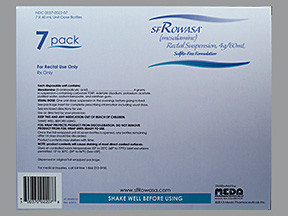
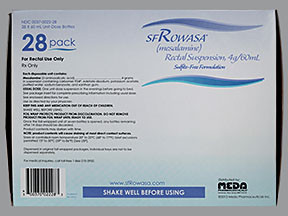

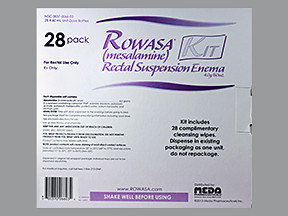
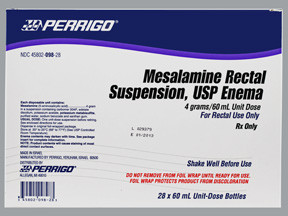
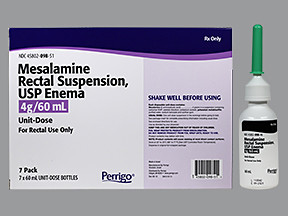
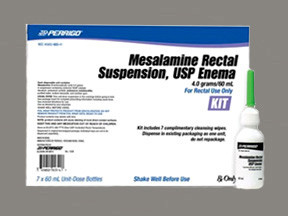
No Reviews Yet